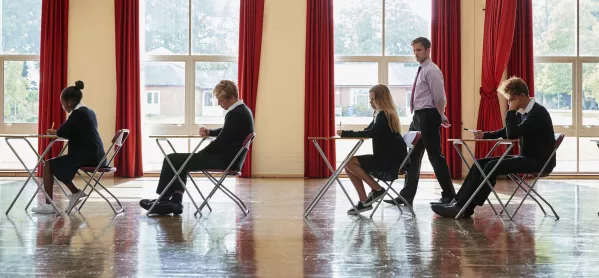Coronavirus: Schools collect mock GCSEs as contingency
Share
Coronavirus: Schools collect mock GCSEs as contingency
Schools are collecting pupils’ mock GCSE exam scripts and performing additional “data drops” - in which teachers record pupils’ current GCSE grade level across year groups - in case final exams are cancelled because of the coronavirus outbreak.
In an email to staff from the head of one school, seen by Tes, teachers are asked to ensure pupils do not take their mock GCSE exam scripts home with them because of “the level of uncertainty with regard to potential pandemic school closure measures”.
Coronavirus: DfE quizzed over potential exam disruption
Will exams be disrupted?: Keep revising as normal, says Ofqual
Covid-19: A guide for schools
The email says: “Please mark, moderate and return grades to students as normal. However, please do not allow them to take their mock papers home.”
The head adds that the papers need to be stored centrally for all pupils, and that pupils should be given only photocopied versions of scripts rather than originals as a contingency in case they are not able to sit official exams.
“While I am sure we will not require the papers, I would rather be prepared than risk any impact on all the hard work of staff and students at this stage” he concludes.
A head of department at the same school told Tes that they thought the measure was a “headless chicken approach” from senior management.
“I think it’s ridiculous,” they said. “I see the rationale behind it because obviously the position we are in as a school means we have to have something in place, but we are not the only school this will affect, and we need to be led by exam boards on this as it is a nationwide thing.”
They added that because the school had received a “requires Improvement” rating from Ofsted, “lots of SLT [senior leadership teams] in schools like mine want to be seen to be doing a lot of things and I feel lots of them have forgotten the reality of full-time teaching”.
The teacher said: “I think it is very unlikely [mock results would be used in the event GCSEs did not go ahead]. We have used up all the AQA past papers so we made up the mock we’ve just done. I’m a former examiner and there are other examiners on the team, so it’s quality-assured, but other schools might not be, so it’s very unlikely this could be used as a benchmark.”
They said mock exams were too open to manipulation - for example, in English exams, teachers could give pupils easy texts to analyse to artificially boost results.
“We could give them an extract with a reading age of 7 or 8, an extract from a Roald Dahl text or a literature text they have studied. There are too many variables for this to be a useful exercise.”
The teacher said that collecting in the mocks was creating more workload, and that staff were now being asked to write a comment alongside any predicted grades they gave pupils with a “shorter turnaround” than usual.
Another teacher told Tes she knew of several schools across the country adopting similar measures, including her own, in which teachers have been asked to carry out additional data entry of predicted grades for Year 11 students. She said schools were taking this approach because of “high-pressure accountability” and a lack of information from the exams regulator Ofqual about how GCSEs would take place in the event of school closures.
“Our internal data is based on current working grades, and those tend to be a very conservative estimate - there’s a concern that if we were asked [by exam boards] what our internal data says pupils would achieve in the summer, it would be lower [than in reality]”, she said.
“So, we are doing an optimistic internal measure - ‘on a good day, if they sat that exam, what would they get?’”
She added: “It does add a bit of workload but, having professional conversations, there’s quite a few schools doing it, and we don’t want to be the school that doesn’t.
“It’s such high-pressure accountability and because Ofqual are issuing the blandest of statements, we’ve just got to do something so that we’ve got our backs covered in case the unexpected happens.”
The teacher said she did not think Ofqual would use data from mock exams as “the accuracy of the papers is different, the validity of the marking is different, they are set at different times”. She added: “Ofqual are not stupid.”
She knew of at least 10 schools collecting additional data for their GCSE cohorts or collecting in mock exam scripts to prepare for closures.
“I cannot see how Ofqual would take that data and make it in any way fair across a cohort. I would trust Ofqual to come up with something that least disadvantages the cohort,” she said.
Ofqual did not wish to give any further comment and referred to its statement on coronavirus contingency plans published last Friday.
Murray Morrison, an education and revision consultant, said today it was “certainly a possibility” that schools might use mock exam results as a basis for final grades if the exams did not go ahead.
“The question will be whether the school is willing to make any modification if your child has shown significant improvement since their mocks. But it’s unlikely that schools will be able to accept many appeals on grades,” he said.




